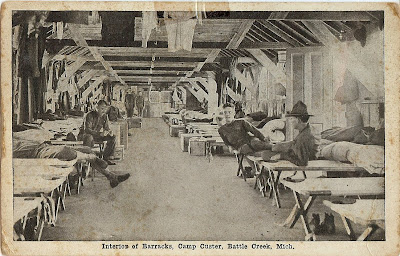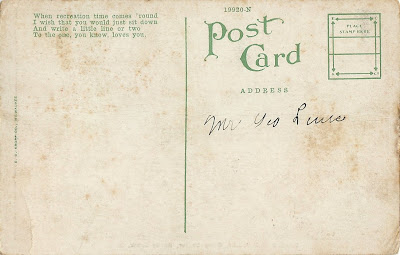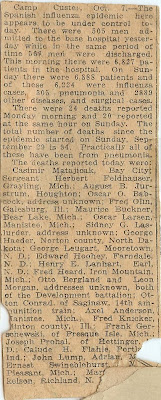From Muskegon Heights, Muskegon County, Michigan, my great-grandfather, William Bryan ROBBINS, was sent southeast to Camp Custer in Battle Creek, Calhoun County. Camp Custer actually lies right at Calhoun County's west border with Kalamazoo County. General George Armstrong Custer is one of Michigan's native sons, and although he is most famous for his unsuccessful battle at Little Big Horn in Montana, he had built up quite a reputation for himself during the Civil War. Camp Custer was built in 1917 to accommodate the training of what would eventually be 90,000 Midwestern troops heading to Europe during World War I. At the end of the war, it was used as a demobilization base for over 100,000 men. Many soldiers, Bryan included, passed through the camp twice: once on their way to war, and again on the way home. This was the home of--among others--the 85th Division, originally called "The Custer Division," but eventually taking the nickname "The Polar Bear Division," because of its service in the American North Russian Expeditionary Force.
During the early 1920s, the predecessor to the Veterans Administration, the Veterans Bureau, established the Battle Creek Veterans Hospital, whose grounds contained 200 acres that were farmed by staff and patients. In 1940, Camp Custer was designated as Fort Custer, becoming a permanent military base. Over 300,000 World War II soldiers were trained there, including my paternal grandfather, Robert Lewis ROBBINS, and his brother, Bill, Jr., sons of Bryan. The fort also housed 5,000 German prisoners of war. In 1981, the Fort Custer National Cemetery was created, with opening ceremonies on Memorial Day 1982. The official address for Fort Custer is Augusta, Michigan, a small community just to the west of the base and located in Kalamazoo County.
Bryan would have been at Camp Custer in late June and though late July of 1918, at which time the 339th Infantry was shipped overseas. In his papers was this postcard of one of the barracks' interior, on the back of which was addressed, "Mr. Geo. Lewis," Bryan's future father-in-law. It wasn't addressed fully, so perhaps it was never mailed, or mailed inside another letter:


There is also a little poem printed on the reverse of the postcard:
Also among Bryan's papers was this clipping of a newspaper article with an update on the Spanish Flu epidemic that hit Camp Custer, apparently that fall of 1918 (the date of the unnamed newspaper is October 7th). Bryan's unit was not at Camp Custer when the epidemic hit; they were on their way to Russia, and I will be blogging more about that, later:

When recreation time comes 'round
I wish that you would just sit down
And write a little line or two
To the one, you know, loves you.
Also among Bryan's papers was this clipping of a newspaper article with an update on the Spanish Flu epidemic that hit Camp Custer, apparently that fall of 1918 (the date of the unnamed newspaper is October 7th). Bryan's unit was not at Camp Custer when the epidemic hit; they were on their way to Russia, and I will be blogging more about that, later:

You can click on the image above to read the article in full in my Picasa Web Album. It is rather long. In the Picasa view, click on the magnifying glass icon in the upper right hand corner to zoom in for an easier read.
For more interesting online reading regarding Camp/Fort Custer, I recommend the following websites:
For more interesting online reading regarding Camp/Fort Custer, I recommend the following websites:
- Camp Custer - Battle Creek, Michigan - a lovely collection of colorized postcards from Camp Custer's WWI era, showing various structures and the troops participating in training exercises
- Camp Custer Photos - from the Willard Library's Photographs from Battle Creek History; includes photos of new draftees marching from the train to the camp
- Fort Custer Photos - also from the Willard Library; WWII-era photos
- Citizens' Military Training Camp, 1924 - a fascinating little-known chapter in the history of our national defense movement
- Fort Custer National Cemetery - contains interesting historical facts about the camp and the fort, as well as the cemetery
1. A Polar Bear in North Russia
2. The Family of Angelo and Lula Robbins
3. Bryan and Marie - A WWI Romance
4. Bryan Gets Drafted
6. Getting "Over There"
7. Bryan and King George V
8. To Russia, With Influenza
9. A Letter from Mother - 25 Sep 1918
10. A Letter from Father - 7 Oct 1918
I realize you posted this a long time ago but I was looking for information on Camp Custer so I could write today's blog and your blog was at the top! Very interesting too I might add. Great newspaper piece and postcard too!
ReplyDelete